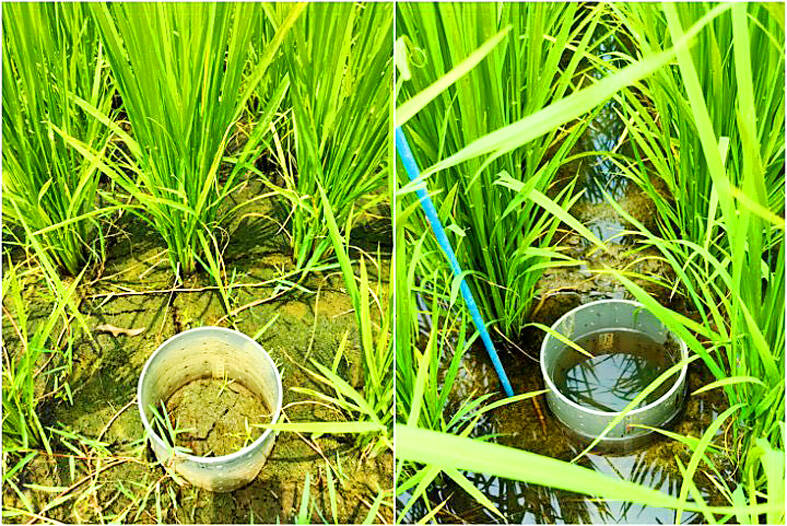The alternate wetting and drying (AWD) irrigation technique can reduce methane emissions from rice fields by 32.5 percent, while saving 21 percent of irrigation water, the Tainan District Agricultural Research and Extension Station said yesterday.
Flooding irrigation has been widely applied in Taiwan’s rice cultivation, but it can easily cause oxygen deficiency in soil and root suffocation, leading to akagare — or “suffocating disease” — that reduces both yield and quality, the station said.
By keeping farmland moist without constant flooding, AWD promotes stronger root development and lowers the risk of suffocation, it said.

Photo courtesy of the Tainan District Agricultural Research and Extension Station
Simulation results using the Denitrification-Decomposition model showed that the method can cut methane emissions by 32.5 percent and reduce water consumption by about 2,500 tonnes, or 21 percent, it added.
AWD assistant researcher Hsu Lung-hsin (許龍欣) yesterday said the AWD technique was initially introduced as a water-saving measure, but has since been found effective in reducing methane.
Microorganisms in oxygen-deprived conditions, such as flooded rice paddies, decompose organic matter and release large amounts of methane, she said, adding that AWD interrupts this process.
To apply the technique, farmers install a perforated tube with internal gradations to monitor water levels in the field, she said.
By digging into the tube with their fingers, they can check the underground water depth and determine when irrigation is needed, she added.
Although the original technique was developed by the International Rice Research Institute, which recommends irrigating when water levels fall to minus-15cm, the approach has proved unsuitable for Taiwan, as it reduces rice yields, Hsu said.
Most rice paddies in Taiwan have clayey soils that dry and crack if irrigation is delayed until minus-15cm, she said, adding that subsequent research found that irrigating at about minus-5cm is optimal for clayey soils in Taiwan.
Agricultural workers can easily make field water tubes themselves by purchasing polyvinyl chloride pipes from hardware stores, she said.
The tubes must be perforated so that the water levels inside and outside remain consistent, and farmland should be leveled in advance to ensure accurate measurements, she added.
Regarding irrigation frequency, fields with clayey soil typically require watering about once a week under the AWD system, while sandy soils might need irrigation as frequently as once a day, she said.

Taiwanese can file complaints with the Tourism Administration to report travel agencies if their activities caused termination of a person’s citizenship, Mainland Affairs Council Minister Chiu Chui-cheng (邱垂正) said yesterday, after a podcaster highlighted a case in which a person’s citizenship was canceled for receiving a single-use Chinese passport to enter Russia. The council is aware of incidents in which people who signed up through Chinese travel agencies for tours of Russia were told they could obtain Russian visas and fast-track border clearance, Chiu told reporters on the sidelines of an event in Taipei. However, the travel agencies actually applied

Japanese footwear brand Onitsuka Tiger today issued a public apology and said it has suspended an employee amid allegations that the staff member discriminated against a Vietnamese customer at its Taipei 101 store. Posting on the social media platform Threads yesterday, a user said that an employee at the store said that “those shoes are very expensive” when her friend, who is a migrant worker from Vietnam, asked for assistance. The employee then ignored her until she asked again, to which she replied: "We don't have a size 37." The post had amassed nearly 26,000 likes and 916 comments as of this

New measures aimed at making Taiwan more attractive to foreign professionals came into effect this month, the National Development Council said yesterday. Among the changes, international students at Taiwanese universities would be able to work in Taiwan without a work permit in the two years after they graduate, explainer materials provided by the council said. In addition, foreign nationals who graduated from one of the world’s top 200 universities within the past five years can also apply for a two-year open work permit. Previously, those graduates would have needed to apply for a work permit using point-based criteria or have a Taiwanese company

The Shilin District Prosecutors’ Office yesterday indicted two Taiwanese and issued a wanted notice for Pete Liu (劉作虎), founder of Shenzhen-based smartphone manufacturer OnePlus Technology Co (萬普拉斯科技), for allegedly contravening the Act Governing Relations Between the People of the Taiwan Area and the Mainland Area (臺灣地區與大陸地區人民關係條例) by poaching 70 engineers in Taiwan. Liu allegedly traveled to Taiwan at the end of 2014 and met with a Taiwanese man surnamed Lin (林) to discuss establishing a mobile software research and development (R&D) team in Taiwan, prosecutors said. Without approval from the government, Lin, following Liu’s instructions, recruited more than 70 software